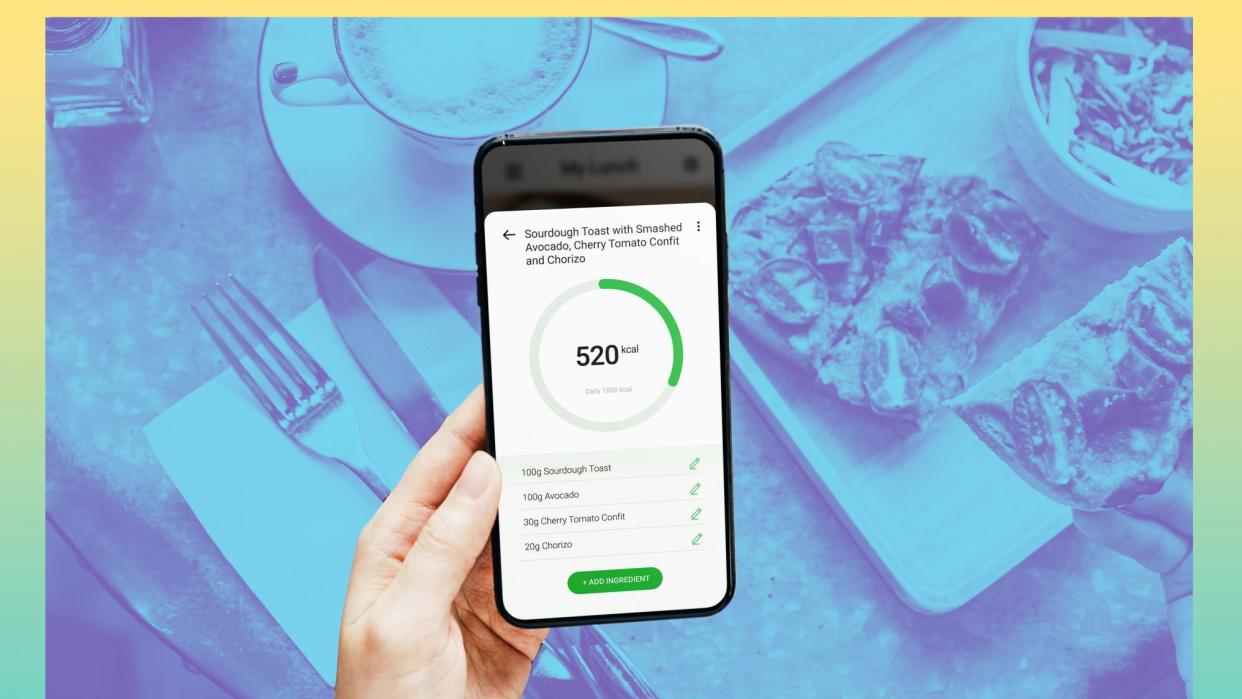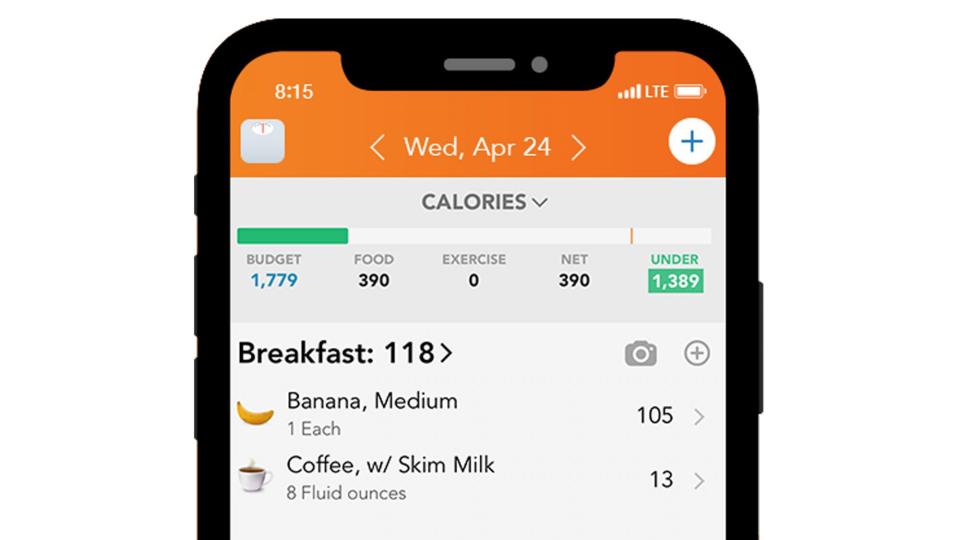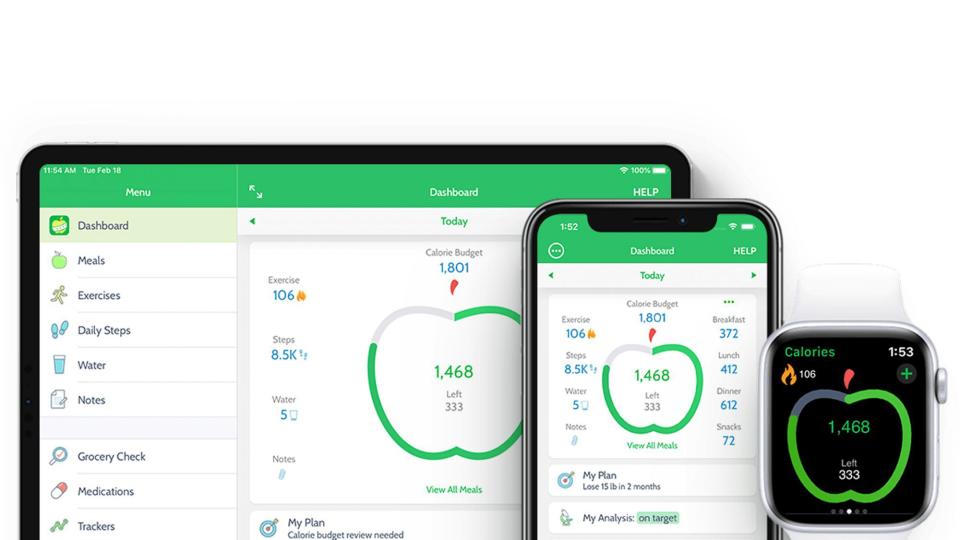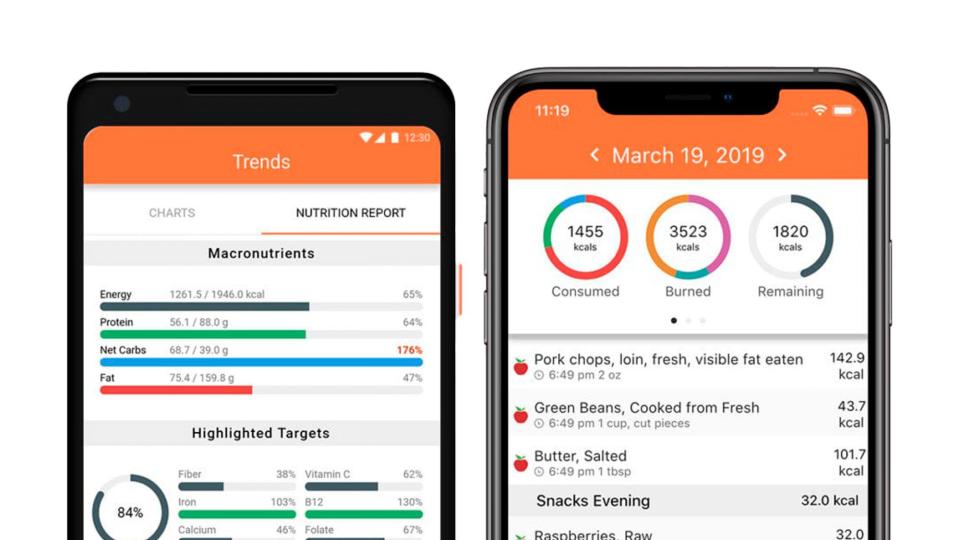How to Find the Best Calorie Tracker App for Your Goals

Getty Images
Whether you're looking to bulk up and make major muscle gains or lose a few pounds, your first course of action might be to follow a lesson you learned way back in health class: Switch up your calorie consumption.
ICYDK, calories are a measure of how much energy you'll get from a certain food, says Molly Kimball, R.D., C.S.S.D., a registered dietitian at Ochsner Fitness Center in New Orleans and host of the podcast FUELED Wellness + Nutrition. And how much your weight fluctuates — or stays the same — largely depends on how many calories you're consuming and how many you're using; eating more calories than you burn generally results in weight gain, and consuming fewer than you use generally results in weight loss, according to the United States Department of Agriculture. (FTR, calories aren't the only thing that matters when it comes to weight loss.)
If you decide to tackle your new goals on your own (read: without the guidance of a registered dietitian or other healthcare professional), a calorie counting app may seem like an accessible, cost-effective way to achieve them. But are calorie tracker apps all that beneficial? Here, Kimball breaks down the pros and cons of keeping count, plus tips on how to find the best calorie tracker app for you if you decide to use one. (Related: Exactly How to Cut Calories to Lose Weight Safely)
The Pros of Using a Calorie Tracker App
While the main draw of calorie tracker apps is their ability to tell you the exact (or, depending on the app, estimated) amount of calories a certain food provides, receiving those stats isn't necessarily the key benefit. Rather, they may make you more mindful of what you're eating and how much, says Kimball. "A lot of times there's mindless eating, you're eating when you're distracted, you're not paying attention," she explains. "So using a calorie tracker can be a way to keep a food log that can help us be more mindful about what we're consuming."
On the same token, these apps can give you a deeper understanding of the nutritional value of your favorite foods. For example, you may think avocados are a good-for-you fruit, but you may not realize the exact reason why until you log it into the app and see they have 10 grams of digestion-boosting fiber and 4 grams of muscle-building protein per cup, according to the USDA.
More specifically, calorie tracker apps can help fill you in on the macronutrients you're scoring — and which ones you may be lacking. (Reminder, macronutrients are the nutrients that your body uses to carry out everyday activities and functions, including protein, carbohydrate, and fat.) For instance, it can be easy to hit or exceed your personal carbohydrate intake goals, thanks to grain-rich meals and snacks, but you may be falling short on protein and fat, as these nutrients aren't always so readily available, says Kimball. Logging your food in a calorie tracker app with macronutrient counting abilities can then clue you into those shortcomings and prompt you to strategize your consumption, she says. "It can definitely make you more aware of those macronutrients and of achieving that balance," says Kimball. (Stocking up on these high-protein snacks can help you get your fill of the macronutrient.)
Given all the facts and figures they provide, calorie tracker apps can also be useful for analytical folks who like using data to achieve their goals, along with individuals who are visual learners, as the best calorie tracker apps often offer charts and graphs showing how your statistics compare over time, says Kimball. People who thrive on social support may benefit from using an app too, as many offer forums or ways to connect with your IRL friends for accountability and advice, she adds. (Related: The Best Home Workout Apps to Download Right Now)
The Drawbacks of Using a Calorie Tracker App
Although having all of your daily nutritional information at your fingertips has some potential benefits, there are some pitfalls.
The primary issue: The daily caloric intake the app recommends for you — typically using your age, height, weight, gender, and goal — probably isn't going to be accurate. "It's a generic calculation — it's not going to be based on you and your metabolic rate, what's going on inside of your body, etc." says Kimball. Similarly, generic formulas are often used to calculate your caloric burn if you choose to log a workout, meaning they likely aren't accurate, either. Depending on what that number is, you may end up adjusting your meals for the day to consume additional or fewer calories, which at best could put you a slight step back from reaching your goals and, at worst, put your health at risk from not eating enough. "You can really lose sight of common sense when you're driven only by numbers, either in terms of what your intake is going to be or what you think your output is, and a lot of times the numbers can be wrong," says Kimball.
Compounding the problem is that the nutritional data in the app may not be accurate if it's supplied by users, says Kimball. In many of the popular calorie tracker apps, a portion of the data is pulled directly from the USDA nutritional database, which provides vetted, lab-tested nutritional information, and the remainder is user-generated, she explains. If one person falsely sets a Trader Joe's yogurt cup as having 0 grams of carbs, for example, and another user logs that item as their snack for the day, their calorie count and macronutrient consumption data becomes skewed.
What's more, having the ability to keep an eye on macronutrient intake — and use those numbers to guide food decisions — doesn't mean you'll automatically make healthy choices, says Kimball. "When someone is so driven by their macros, a lot of times the quality of the carbs, for example, isn't fantastic," she explains. "[You might say] 'I'm going to have whatever I want because it fits my macros.' Well, you still want to be sure that the quality is good, so you don't want to be driven just by the numbers." For instance, a chocolate chip cookie may "fit your macros," but it's not all that beneficial to your health if it's made from nutritionally void refined grains — not fiber-rich whole grains that boast energizing B vitamins and healthy fats, according to the Harvard School of Public Health.
Due to the hyper-focus on calorie counts and nutrient intakes, Kimball wouldn't recommend calorie tracker apps to folks who have a history of disordered eating or obsessive-compulsive tendencies in other aspects of their life. "If they let this affect their mood or self-worth, or it makes them feel like they're failing if they're not achieving the macros they want, which happens all the time, this is not something that's going to be a healthy habit to add in," says Kimball. (See: Counting Calories Helped Me Lose Weight — But Then I Developed an Eating Disorder)
What to Look for In a Calorie Tracker App
If you've weighed the pros and cons and decide you want to go forward with using a calorie tracker app, book an appointment with a registered dietitian straight away, says Kimball. Your provider will be able to measure your resting energy expenditure (how many calories you burn at rest), note your daily activity level (both purposeful and non-purposeful exercise), and consider your physical metrics and goals to determine an accurate, personalized caloric intake recommendation for you, she says. Likewise, they'll be able to help you figure the optimal balance of macronutrients to nourish your body.
"I would rather someone take the extra effort and meet with a professional even just one time to have [a calorie recommendation] identified for you specifically," says Kimball. "Even if it's just one consult, and then that arms you with so much more personalized information that you can then take to something like that food tracker."
When choosing the best calorie tracker app for you, Kimball says the most important quality to look for is user-friendliness. Look for an app that provides food recommendations for your log based on what you ate the previous day or week, suggests Kimball. That way, you won't need to repeatedly search for the "roasted chicken" or "broccoli" you've been eating for leftovers four days in a row. Then, look at the app's FAQ section or email the company to find out how much of the nutrition information is user-generated and what the verification process for this data is like, she suggests. If the majority of info comes from users themselves and there's no fact-checking system in place, you might want to find a new app.
To kick off your search for a tool that will help you meet your wants, needs, and goals, consider these best calorie tracker apps available right now.
MyFitnessPal

App Store / MyFitnessPal
One of the most commonly used calorie tracker apps among Kimball's clients, MyFitnessPal has a food database consisting of more than 14 million foods, according to the company. If you don't feel like searching for every ingredient in your meal, add them from your history, scan your ingredients' barcodes, or use the app's Meal Scan feature, which makes use of your device's camera and AI technology to log your dish.
In addition to tracking your calories, the app can also record your carbohydrate, fat, and protein consumption — and show you how it compares over time. That said, many of the foods in this best calorie tracker app's database are user-generated, so there may be inaccuracies. Look for foods that have a green checkmark in their listings, which means the nutrition information "accurately reflects" the information from the product packaging, according to the company. (ICYMI, carbohydrates are super important for your workouts.)
Available in the App Store and on Google Play.
Lose It! Calorie Counter

App Store / Lose It!
With more than 27 million foods in its database, this best calorie tracker app is a fit for foodies who are always putting new recipes and unfamiliar ingredients to the test. The app offers a barcode scanner and the ability to log your food just with a photo, making tracking your eats — plus their caloric values and macronutrient profiles — easy. Note: The nutritional information for many of the featured generic foods is pulled from the USDA's database, while others are added by members, the Lose It! team, or through barcode scans. To ensure your personal data is accurate, opt for foods that have been verified as accurate and show a green checkmark, according to the company.
Aside from those standard features, the app can also track your water intake, body measurements, and sleep cycles and pairs with Google Fit, Apple's Health app, and fitness trackers from Fitbit and Garmin. And if you thrive off of a little bit of competition, you'll enjoy the app's individual and team challenges, including ones for fruit and veggie consumption and exercise.
Available in the App Store and on Google Play.
MyNetDiary Calorie Counter

App Store / MyNetDiary
If you're just as interested in your consumption of key vitamins and minerals as you are macronutrients, try this best calorie tracker app, which has a database of more than 1 million foods. Along with calories and macros, MyNetDiary logs up to 37 nutrients, including calcium, iron, vitamin K, potassium, sodium, and more, according to the company. Plus, the app offers an augmented reality grocery shopping tool that allows you to view a food's nutritional profile and see how it'd fit into your diet while it's still on the shelf. And to ensure accuracy, the calorie tracking app's data team verifies the nutrition information of all user-contributed foods, according to the company.
Available in the App Store and on Google Play.
MyPlate Calorie Counter

App Store / MyPlate
Not to be confused with the USDA's MyPlate food guidance resource, LIVESTRONG.com's MyPlate calorie counter app has a database of more than 2 million foods, tracks your macronutrient and water intake, and even has a meal reminder function to ensure you stay fueled. Thanks to the barcode scanner, you can log your ingredients with ease, and the in-app workouts will help you spend less time browsing YouTube for a sweat sesh and more time getting active. A word of caution: The company uses the third-party food database Nutritionix (which doesn't disclose its sources) for its nutritional information, so you may want to take the data with a grain of salt.
Available in the App Store and on Google Play.
Lifesum Calorie Counter

App Store / Lifesum
Of all the best calorie tracker apps, Lifesum's is the most basic. The app records your calorie, macronutrient, water, fruit, veggie, and seafood intakes; has a barcode scanner for stress-free logging; allows you to save your favorite foods and recipes for easy access. Plus, you can sync your data with the Apple Health app, allowing you to have your nutrition and fitness information in one hub. Since the app sources its data from the USDA's database, its own team's research, and users, you'll want to opt for foods that have a small blue badge next to them, meaning they've been verified by the company as correct, for the most accurate info.
Available in the App Store and on Google Play.
Cronometer

App Store / Cronometer
Just like MyNetDiary, this best calorie tracker app shows you your consumption of calories, macros, water, and 82 micronutrients, but it takes the vitamin and mineral tracking one step further by allowing you to input your supplement intake, too. The app's barcode scanner can be used to track your snacks while on the go, and its custom recipe function allows you to combine your favorite meal's ingredients together as one item for easy logging. Plus, every piece of user-submitted nutrition information is reviewed and verified for accuracy before being added to the database, according to the company.
Available in the App Store and on Google Play.

